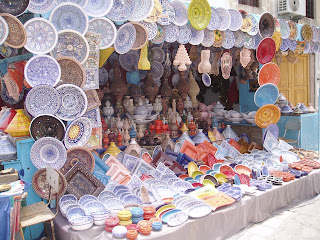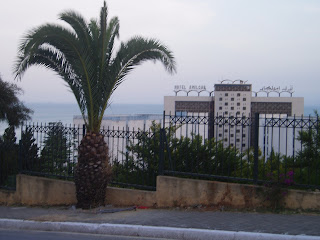Bonjour tout le monde! I figured it was about time to update this blog. I just got back to La Marsa after attending the Pickering Fellow orientation in D.C. Going and coming back within 3 days wasn’t as aweful as I thought it would be, although the last few days feel like a whirlwind or a distant dream. But let me start from the beginning of where I left off the last time.
My Tunisian life has officially begun—I moved in with my host family on Sunday and they are absolutely lovely! I live in La Marsa, a suburb of Tunis that is about a fifteen minute bus ride from my school in Sidi Bou Said. There are also a lot of other students with the program in that area, so we can take the bus together and meet up easily. The family is a mother, father and two girls, one 17 and one 22. They are very laid back, which has been the case with most of the host families—they work hard during the day and in the evening just relax, watch television and eat a late dinner (we didn’t eat until 11:30 on Sunday!). The father’s been making the rest of the family suffer through Al-Jazeera English the past few evenings, so that I can make sure to stay up-to-date on the news and understand it all. It’s kind of cute, but puts them all to sleep. And the father comes from the Congo, so he’s actually more comfortable with French—I think he can understand Arabic, but he always responds in French. The program warned us at the start to say that we didn’t speak any French, because that would force us to use our Arabic more. On the first day, my family and I were all trying to just speak Arabic, but after I told them where I’m from and a few sentences about my family, it was obvious that that wasn’t going to get us far and when they all started speaking French, I couldn’t lie and act like I didn’t understand. So, I think my French is improving, or at least I’m starting to become more comfortable with conversational French.
The next day, Monday, my Arabic classes started. The 32 of us are divided into 3 groups and each have two teachers—one in the morning and one in the afternoon. We have two hours of class in the morning (8:30-10:30) followed by a half-hour break and another two hours of lessons. We are mostly learning Modern Standard Arabic, but have 40 minutes of Tunisian dialect every day, too. So far, we’ve studied the alphabet. It’s coming along well, but I think it will take a long time until we can easily see a word and recognize it without having to spend time playing with the sound of each syllable. After class, we’re free to go out to lunch in the area and can come back and work at SIT in the afternoon and the Arabic teachers are available then. In the evenings we’ll have different things to do. This week, we’ve had another Tunisian dialect lesson everyday from 5-6. We’ll also have a Tunisian cultural class every week. People can choose which to take and I’m signed up to take pottery—something I’ve always wanted to learn!
Yesterday, I took advantage of how beautiful Sidi Bou Said is and walked down to the beach with some people in the program after our evening class. We walked past the president’s palace and giant cliffs I didn’t know existed in Sidi Bou Said. Once at the beach, we stumbled across a pier-esque sort of attraction with cafes and souvenir shops. I’m just constantly surprised at how easy Tunisia has been to maneuver. I was so nervous about figuring out how to get home from where we walked to, but then the right bus kept falling into my lap. At one point I even started to run to the bus stop a block away when the bus I needed was coming up behind me, but then it just stopped and allowed me to board even though I was nowhere near the stop. That never happens in Louisville! Aside from their hospitality, Tunisians have also won me over with their food. I thought being a vegetarian would be a total pain, but everywhere I go, people are willing to work around it and it’s not even that hard, because they eat so many fresh fruits and vegetables here. Everything is very spicy though!
So, I left for D.C. on Wednesday morning, arrived Wednesday evening and had orientation on Thursday and Friday before leaving Friday night. I flew AirFrance (which was kind of scary given the recent crash) and the program even flew me first class! I was so caught off guard—somehow I hadn’t noticed the “Affaires” stamped on my tickets, so I had champagne to celebrate and watched this hilarious movie called “New in Town” with Renee Zellwiger. Normally I wouldn’t mention the movie, but the whole thing was practically a roasting of Minnesotans, so I could wholly relate and have had so many of the same experiences when I first moved up to the Great Midwest. The first day of orientation was spent at the Main State office. We had briefings about the contract we were to sign, the different components of the fellowship and were walked through the different clearances we’re going to have to get. We then went on a tour of the “Watch” office, which is a 24-hour office that reports on all the most important late-breaking news stories to different government officials. We were even on the same floor as Hillary Clinton’s office. That evening, there was a big reception for all of the Pickering Fellows (20 undergrad and 20 grad), as well as the Rangel Fellows. It would have been really fun, except I had the worst migraine ever. But still, ambassadors were there and all sorts of interesting people to talk to.
The next day was spent at the Foreign Service Institute in Virginia, where Foreign Service Officers are trained. We learned that for every post we’ll be assigned whose language we don’t speak proficiently, we’ll be taught the language—a 3 month training for average languages, 6 months for world languages and 1 to 2 years for critical languages (like Arabic). One of the Foreign Service language schools for Arabic is actually right here in Tunisia and one of the teachers for this summer program teaches there, too. For most of Friday we had various panels about the different cones of the Foreign Service, which are management, political, econ, public diplomacy and consular. They are just more specific job titles we’ll have to choose once we’re in the Service. I’m leaning towards political, which includes doing research on the political climate of the host country and writing reports. The political officers are the ones that publish the annual human rights reports. We also had lunch with Pickering Fellows who are currently in grad school or in the Foreign Service, so we got to learn more about the actuality of the fellowship and life in the Service.
And now, I'm back in Tunisia. I was worried about how it would be coming back here, whether or not I would regret reboarding the flight to come back after the reminder of what America is like. But as soon as I walked in and kissed my family hello, everything kind of fell into place again. The food at lunch tasted right, the cheesy leopard print sheets on my bed looked right and the lack of air conditioning almost feels right, too.
 We then visited the Great Mosque, an increadible, beautiful and huge structure that is one of the most important mosques of North Africa. This was my first time visiting a
We then visited the Great Mosque, an increadible, beautiful and huge structure that is one of the most important mosques of North Africa. This was my first time visiting a  mosque and I was blown away. The building was made from Roman and Byzantine ruins, with columns and tiles taken directly and not changed a bit, as you can see in the photos. Because we were not Muslims, we were not allowed to enter the prayer room, but we could peer in and see the floors covered in mats, and people setting up for the prayer at 12:30, because it was a Friday. All of the women
mosque and I was blown away. The building was made from Roman and Byzantine ruins, with columns and tiles taken directly and not changed a bit, as you can see in the photos. Because we were not Muslims, we were not allowed to enter the prayer room, but we could peer in and see the floors covered in mats, and people setting up for the prayer at 12:30, because it was a Friday. All of the women were, of course, asked to wear headscarves. You can see some of us here posing with the entrance to the prayer room in the background.
were, of course, asked to wear headscarves. You can see some of us here posing with the entrance to the prayer room in the background.  Following the Great Mosque, we went to a smaller Berbere mosque. You can notice how beautiful the tiles of the mosque we
Following the Great Mosque, we went to a smaller Berbere mosque. You can notice how beautiful the tiles of the mosque we re. But once we entered the courtyard, I looked through an open window of the prayer room and saw a little boy being circumsized right in the open. Then, he walked out with his father and all of the Tunisians on the trip wished him Mabrook! (Congratulations) and the father preceeded to lift the little boy's gown and show us all. I have to say, I think that was the first time I've experienced such blunt culture shock.
re. But once we entered the courtyard, I looked through an open window of the prayer room and saw a little boy being circumsized right in the open. Then, he walked out with his father and all of the Tunisians on the trip wished him Mabrook! (Congratulations) and the father preceeded to lift the little boy's gown and show us all. I have to say, I think that was the first time I've experienced such blunt culture shock.



 A view down the street from my school. Just so you know, it's really hard to do Sidi Bou Said justice with a camera.
A view down the street from my school. Just so you know, it's really hard to do Sidi Bou Said justice with a camera.






